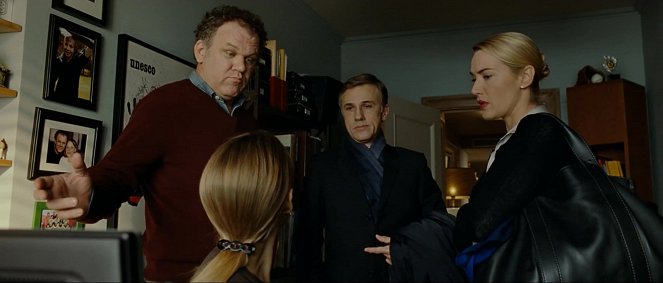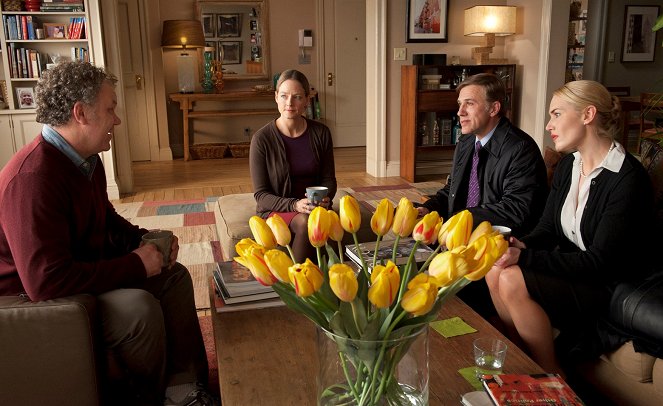Directed by:
Roman PolańskiCinematography:
Pawel EdelmanComposer:
Alexandre DesplatCast:
Jodie Foster, Kate Winslet, Christoph Waltz, John C. Reilly, Elvis Polanski, Joseph Rezwin, Tanya Lopert, Julie AdamsVOD (2)
Plots(1)
Penelope and Michael Longstreet (Jodie Foster and John C. Reilly) and Nancy and Alan Cowan (Kate Winslet and Christoph Waltz) - who meet for a discussion after their sons are involved in a violent incident in the school playground. Despite their honourable intentions, long-suppressed resentments and hostilities soon flare up both between and within the couples, leading to a rapid deterioration in civilities. (StudioCanal UK)
(more)Videos (13)
Reviews (11)
Everything Roman Polanski gains from Christoph Waltz's grimace or Kate Winslet's untenable mimicry is destroyed by the overblown premise that could never work fully outside the theater. All the coming out of doors and calling the elevator is too stupidly unnecessary in the first half, when it is absolutely clear that it will lead to nothing and everything has to return to the two rooms with incomprehensibly violent crutches. The sad irony with directly corrosive satire at its heart would work much better without convulsively snaring the plot in a single place; as it is, this massacre only manages it through hints.
()
“My Kokoschka!“ With films such as Repulsion, The Tenant and Death and the Maiden, Polanski demonstrated that he can build tension with just one room and a few actors to the point where we are ready for anything while having no idea what to expect. Carnage is made up of concise scenes, yet it continuously puts great effort into the absolute deconstruction of civilisation (which, together with the enclosed space, is reminiscent of the darker The Exterminating Angel). ___ The quartet of sufficiently different people who are, however, afflicted with the same social pretence gradually forget the basics of polite behaviour and even what social group they belong to. They lose their cool, inhibitions and even control over their own bodies, driven by concealed aggression and instinct (grunting laughter, automatic reactions to a ringing telephone). ___ In contrast to the original plan (a calm discussion in a setting decorated with tulips from Holland), the non-observance of which will most adversely affect Penelope, they begin to reveal their own transgressions and character flaws with devastating honesty. Their attachment to material things (mobile telephone, handbag, cigars, a bottle of Scotch, art books) is merely a triviality to get the ball rolling. ___ Their inability to face the unpleasantness which they would prefer to remove from their lives, like getting rid of a bothersome hamster, comes back to haunt them. We are not watching the failure only of individuals confusedly taking on different roles (man/woman, partner, parent) for a moment, but of an entire community. Only by gradually breaking down the civilisational walls that we build around ourselves is it possible to return from selfishly resolving personal problems to the suppressed collective (un)consciousness. Rejoining the clan that we left voluntarily and whose other members we only pretend to be interested in. The meeting, whose consequences are wisely concealed from us, could be beneficial for the participants at least as a means of returning them to their wild essence (indicated by the drums in the opening and closing background music) and the attendant self-discovery. ___ Behind the comedy, intensified with perfectly timed jokes to the point of inducing a nervous breakdown in everyone involved, there is a bitter, almost anthropological study of human dissatisfaction and the inability to overcome that dissatisfaction. (Their publicly revealed unhappiness derives “only” from honestly describing their current state.) For example, through the entirely banal acceptance of responsibility for parenting. Also, dealing with outside and, for example, even very remote problems (Darfur) doesn’t offer any redemption, but just another way to avoid the essence of the matter at hand. This is correctly pointed out by Alan, whose absolute indifference to the fleeting family-relationship bullshit enables him to have the most sober view of the whole farce (another thing is that his work may be even more fleeting as a result of that indifference). ___ Waltz’s precise gestures and intense emphasis on words with the potential to create conflict, complemented with the nonchalance with which he turns the Longstreets’ apartment into his workspace (or rather a café with a bar) make him the star of the proceedings in my opinion. With his “I don’t think anything” attitude, John C. Reilly is also excellent, as his Michael, an entirely simple man burdened with a mostly unresolved Oedipal complex, is the first to lose interest in pretending. However, the women do not stay in the background, as they are believably hysterical and, at the same time, above the men’s one-upmanship. ___ The mirror in the film serves to optically enlarge the space and, like the placement of the characters in the individual shots, informs us of the current distribution of belligerent forces, while the film itself is also a mirror. If you’re willing to look into it for a mere eighty minutes and think about what you’ve seen, perhaps it will, for starters, make you not brush off the question “How are you?” with the same answer as usual. Yeah, idealism. I’m healing. By observing people. Appendix: It occurred to me later that Carnage could also be understood as a politically incorrect response to The Descendants, a film that avoids the truth with such determination that if there were any sex in it, the people doing it would probably pray even when casting off the masks of civilisation (another one of Alan’s apt observations). 90%
()
(less)
(more)
The theater play has made it to the big screen. It's nothing unusual, it has happened often in the past. For example, classic Universal horror movies were originally theater plays. "God of Carnage" is a new play that I had the chance to see on stage. I still remember it. Roman Polanski didn't do anything else but transfer the play to the screen. He managed with only four characters and created a drama that criticizes society, our dependence on communication technologies, and our inability to communicate. The performances are great, you can't find fault with them, but it is still mainly a theater play that doesn't bring anything new in its film adaptation. On the other hand, the performance is more magical in the theater, especially when half of the audience in České Budějovice was right on the stage. In the movie, it's just a repeated experience that doesn't stand out in any significant way, but it also doesn't disappoint. More: http://www.filmovy-denik.cz/2012/04/diar-milovnika-filmu-c-0004-hugo-buh.html
()
Apparently, it doesn't take much to make a good and interesting film. And it doesn't need to burn either a budget or time. One apartment, four people, and well-written dialogue, where you know where it’s going but you still enjoy it. I was expecting a slightly different ending, God knows why, but I'm certainly not complaining. Pretty good, a strong 3.5 stars.
()
Polanski et al. have the misfortune that I saw Carnage at the theatre. There, it made me almost die in laughter, at the cinema, however, I smirked amusingly here and there (mostly over Christoph Waltz’s smirks) and laughed (reminiscing the theatre play). It’s a good film, no doubt, with good performances and direction, but I can’t avoid being disappointed, even though I’m rationally aware that comparing a theatre play with a film is stupid. Though in this case is not that stupid actually, because you can really see the theatrical origin of the film… Some lines are clearly not uttered by a normal film character, but very “theatrically” by a character in a play.
()


